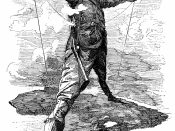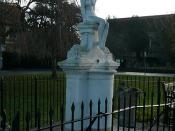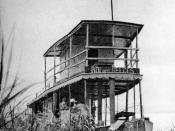Joseph Conrad's novel, The Heart of Darkness, is a multifaceted novel. It seems to portray several different ideals, each very plausible and intriguing. There is, of course, the main idea, which is the examination of imperialism. But scholars have also examined the relation between the settings of the African Congo, where Conrad himself once visited, and the civilized world of Brussels and England. Also, the issues of race and gender play a vital role in its interpretation.
The European expansion of imperialism was thriving during this novel and is portrayed as a greedy and vicious practice by Marlow. The Europeans justify their actions as bringing civilization to the lesser-developed nations in the world, but at the same time they greatly profit from the ivory they collect in Africa and their inhumanity to man is shown through the eyes of Marlow.
The second ideal could be Marlow's disillusionment with the progress of imperialism.
He longs to find the right European representative of imperialism, but is constantly disappointed by the actions of others who are in charge. He hopes to find that person in Kurtz, but finds a completely different man, who uses the cause of imperialism to create profit. But, in comparison to the greedy ways of the Manager, Kurtz is a more positive alternative. In the end, Marlow settles for his ideals and imperialism continues.
The last ideal is Marlow's own contradicting thoughts and feelings along his journey in Africa with the whole process of imperialism. He knows what is right to do, but fails to do it in the end. But, he does not totally sell out because his conscience is constantly at war with these good and bad notions. This shows the complexity of human psychology between what is right and what is...


